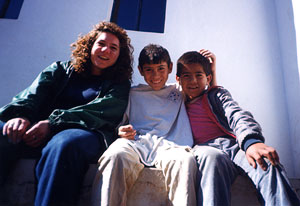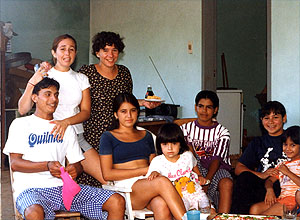Corps Values -- An article I wrote about my Peace Corps Paraguay service

Sharyn Obsatz, photos by Sharyn Obsatz
Source: Santa Fe New Mexican. 11/21/1999, pE-1-1. E-1.
Focus
We were sitting against the ruins of a bathroom wall in the vacant grass lot where Kitolo lived with two other street kids. It had started to drizzle. Kitolo, 15, was crying as we talked for 2 hours about what his dead mother would want for him in his life and how she would feel about him sleeping in the bushes and sniffing shoe glue. He considered going to live in a Catholic boys home nearby, where he could learn to read and practice a trade.
It felt like a breakthrough in my work with Kitolo, one of 250 kids working on the streets of the Paraguayan city of San Lorenzo, my U.S. Peace Corps assignment site in South America. We had never really talked like this before, and he hugged me when I left.
But throughout the following days, weeks and months, he said only about 10 words to me or shrugged when I visited him at the street corner where he washed the windows of cars and buses waiting at the stoplight. When I finished my two years of service in the Urban Youth Development program, Kitolo was still working on the streets and had taken up smoking marijuana daily with his friends.
This frustration, the frequent feelings of impotence, was one of the toughest things for me to accept during my Peace Corps service.
I had some successes too, and I'll tell more about them later. I'm still glad I went to Paraguay. I came home more mature, more realistic and feeling much more alive.
Like most volunteers, I joined the Peace Corps hoping to make the world a better place. At age 26, I had worked in journalism for four years, including three at The New Mexican, writing about teens in trouble, in gangs, running away from home, getting arrested, getting pregnant, dropping out of school, always pulling themselves down. I wanted to stop being an observer and start getting involved.
I had another newspaper job offer at the time my Peace Corps Service Invitation arrived. Friends and coworkers argued that I had my whole life to sit behind a newsroom desk, I had only now to try the Peace Corps.
There's 50 volunteers from New Mexico currently serving in the U.S. Peace Corps, which has agricultural, health, business, education and environmental projects in 78 developing countries throughout the world.
I was lucky, I'll admit it. The Urban Youth program differs from the image most people have of Peace Corps volunteers living isolated in mountain villages, stuck deep in the jungle or stranded on farming towns. I lived in a poor, dirt-road barrio of Paraguay's second largest city. I had a tiny house in a family's backyard, with an indoor bathroom, cement floors and an electric hot-water shower contraption.
I visited one of my fellow volunteers, a rural schoolteacher, after a thunderstorm and we had to walk through quicksand to the outhouse. One of her flip-flops disappeared in the muck.
Both city and country volunteers alike share their yards and streets with dogs, cows, horses, pigs and chickens. My neighbor's hen liked to lay her eggs in my outdoor sink, squawking loudly each summer afternoon while I was trying to sleep through the 104-degree heat.
I had electricity for a fan, but no heat in the winter, which means 40 degrees Farenheit can feel pretty cold getting out of the shower, even for a Minnesotan like myself.
The U.S. government gave me $200 a month in Paraguayan money to cover my $70 rent plus food, job supplies and bus fares. I splurged occasionally on sandwich cheese and Froot Loops.
To encourage grass-roots development, Peace Corps puts only one volunteer in each community so that they are forced to interact more with their neighbors and rely on their friendship. I was the only U.S. citizen most of my neighbors had ever met.
I worked with school dropouts, potential leaders, children who worked on the streets and other teens in my barrio. I helped two Catholic youth groups win a grant to run a Saturday tutoring, recreation, health and free lunch program for street kids. With neighbors, we set up youth groups, a girls craft group and a summer camp.
The Kids
I never wanted to teach English, but I did anyway because the teens in my neighborhood asked me to. Luis, 14, a school dropout whose mother died and whose father was an alcoholic, excelled in class. I told him after class one day that he was lucky to have been born so intelligent and should do something with his smarts. He started night high school, paid for his own uniform and fees and stopped hanging around the drunken and rowdy group of guys in the neighborhood.
I met Nuri one night when she was drinking with friends at the neighborhood playground. She was 15, dropped out in sixth grade, left home to avoid an abusive dad and basically sleeping with men to have a place to live. She wasn't very proud of herself. We went to the family planning folks at the health clinic and the nurses talked to her about protecting herself. That winter, she volunteered as my assistant in leading 6th graders to paint a world map mural on a wall of their school in the barrio. She beamed when she saw a story about her map in the national newspaper.
Raquel, 14, couldn't go to high school because her family had no money. She just stayed home all day watching telenovelas. She joined a youth group I formed with the youth leader of a neighboring barrio and got invited to national youth conferences. She also became the librarian of a community library organized by mothers in the barrio with books sent by schoolchildren at my stepmother's elementary in Minnesota.
What I Tried But Failed to Do:
I just loved waking up every morning for a week to find a different chewed up, poopy diaper on front porch, a gift the neighbor's dog brought from banks of the arroyo that runs through my neighborhood and by my house. The diaper was tossed by my other neighbor, Antonia, who despite discussions during our friendly ice tea breaks each morning, preferred to throw her family's trash in the arroyo instead of walking 30 feet to the garbage bin.
She wasn't alone. Nearly half of my neighbors, some of them really nice and some of them really crabby, threw their trash in the arroyo daily. Then when it rained, the arroyo flooded and washed their trash into the homes of poorer families downstream. In the summer, I could smell the rotting garbage blocks away.
I helped some environmentally minded neighbors form a barrio commission and persuaded the city to extend garbage collection service to streets that dead-end in the arroyo. The commission is still active, the garbage service continues and the trash still flows downriver.
My other big frustration was the daily child abuse. With houses so close together, I couldn't help but see it, hear it and hate it. One neighbor bought beer instead of medicine to kill the worms living under the skin of his daughters' ankles. Another neighbor staked her 4-year-old kid to the ground in the backyard like a dog because he disobeyed her. My neighbor girls were so cute but so insecure because their mother always called them ``stupid'' or ``useless'' and hit them at least once a day.
We talked about it, discussing other ways to discipline kids and places to get free medicine for parasites. I took one mother to talk to a social worker about her unruly children. I helped the city government organize workshops for teachers on how to detect child abuse and how to report it. While Paraguayan officials and educators focus on children's rights campaigns, most of the people I met believe it's okay for parents to hit their kids.
Not really fun
It's a definitely a different kind of fun. Single women don't really go out much in Paraguay, except in the capital city. In fact, no one has money to go out much. I spent many nights listening to the radio and playing cards Rummy 500 with friends or solitaire if alone. Most volunteers read about 100 books a year, favoring quick mysteries and escapist romance novels.
Every weekend, there's at least one fundraising festival or quinceanos birthday party in the neighborhood where, of course, I'd have to behave like a saint.
Most volunteers find one or two people at their site they can relate to on a deeper level. I had great conversations with the Paraguayan family I lived with during training. Their cousin Ani was my age, a law student, a former reporter and doubly guy-crazy. We spent hours talking on the brick patio as night fell and the mosquitoes started to bite.
I also traveled with friends and fellow volunteers to hidden waterfalls, breath-taking mountain lookouts and Buenos Aires night clubs. Our Christmas party one summer just got out-of-hand.
Was it worth it
While I was gone, friends wrote prize-winning newspaper articles, met their future spouses, bought houses and drank a lot of really good coffee. I missed seeing my sister playing a fairy in her high school's production of Midsummer Night's Dream. I missed watching my dad win a Minnesota award for his book. I just missed being with my family.
But I gained a broader perspective of the world through taking two years off from my career and my life in the United States. I became fluent in Spanish. I made new Paraguayan friends. I learned to work without supervision, to trust my judgment. I made myself get out of bed everyday to do my job, even when things were rough, even if no one would have known the difference.
I realized how motivated I am to use my heart and brain to help teens make good decisions in their lives. One-third of the volunteers in my group ended their Peace Corps service early. I'm proud I stuck it out.
Photo Captions
1. As a Peace Corps volunteer, Sharyn Obsatz helped 6th-graders paint a world map on their school in the low income neighborhood of San Juan, San Lorenzo, Paraguay.The project's teen coordinator, Nuri, 16, was an elementary-school dropout who survived by living with her boyfriends.
2. Kitolo, 15, washed windshields, slept in a vacant lot and talked about wanting a better life.
3. The family of 14-year-old Raquel, far left, couldn't afford to send her to high school, so she volunteered as the neighborhood's librarian.
4. Peace Corps volunteer Sharyn Obsatz said her final goodbye to Mariela, a 9-year-old English student and neighbor, in August.
Source: Santa Fe New Mexican, Nov 21, 1999, p1, 1p
Item: 378893245

